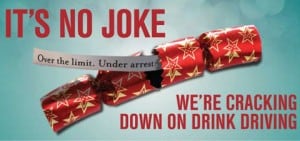
The Christmas 2015 festive season will see the annual police initiative to crack down on drink drivers. Driving and motoring offences have particularly serious consequences for Company Directors and Business Owners, for whom our Business Defence Solicitors typically act. It may be that you find yourself on the receiving end of a request to provide a roadside breath test. Unfortunately some motorists will find themselves over the limit due to a mistaken belief as to how much they can drink whilst remaining under the legal limit. Some may refuse to co-operate with a police request for a breath test because they have a genuine but mistaken belief that in the circumstances they shouldn’t have to, resulting in a conviction and disqualification for “failing to provide a specimen”.
The views people hold on the amount of alcohol they can drink before being over the drink drive limit vary greatly. There is no definitive guidance as the answer will vary from person to person. How quickly a person’s body absorbs alcohol and how quickly it is then expels it will be determined by factors such as an individual’s gender, age, weight, medication, liver functioning and when they last ate. In recent years the strength of beer and the size of a “standard” wine glass served at licensed premises has increased meaning that anything more than one drink could potentially put you over the limit even if there was no alcohol already in your system. Having a strong coffee, shower or sleep might make you feel more sober and alert but will not reduce your alcohol reading.
You should only be asked to provide a specimen for analysis if a police officer has reasonable grounds to suspect you have committed a specified motoring offence or that you have been driving under the influence of drink or drugs. The police should not request a specimen because they have decided to undertake “random” breath tests in a particular location. However, if you are requested to provide a breath test you shouldn’t refuse to comply in the belief the officer had no grounds to ask for one. The police have the power to pull over any motorist and once they have done so will often state they could smell alcohol or notice glazed eyes which then gives them the right to require a breath test. This is something which is very difficult to challenge and a refusal is likely to lead to an arrest and charge or “failing to provide a specimen”. If you have not been drinking and feel that you have been unfairly targeted it is best to co-operate and complain later.
You may be asked to provide a specimen of breath in circumstances when you have been drinking but not driving. A typical example is where passengers or bystanders at a scene of an accident have been requested to provide a breath test when the police believe they were one of the drivers involved. Another is where the police arrives at a person’s home asking them to provide a breath sample following a report that they have driven home from the pub whilst drunk. If you find yourself in one of these scenarios you should comply with the request. You may be over the limit but the fact you were not driving whilst over the limit is a defence to drink driving. The fact you were not driving is not a defence to “failing to provide” if the police officer had reasonable grounds to request a specimen.
There are number of legal requirements that govern how the police should conduct a drink drive procedure. They will differ depending upon factors such as where the request is being made, what testing equipment is available and whether there is a medical reason they can effect a person’s ability to provide a specimen of breath, blood or urine. Sometimes a failure by the police to follow the rules can mean the procedure was unlawful.
In Leicestershire, the Leicester Mercury have reported Officers will stage extra patrols across the city and county over the next four weeks. The Leicestershire Police have also confirmed that it is the first festive campaign to see officers using the new roadside testing kits which enable them to identify motorists who have taken to the road under the influence of drugs such as cocaine and cannabis.
If you are charged with “drink-driving”, “drug driving” or “failing to provide” you will be facing the risk a driving disqualification and in the worst cases imprisonment. You should seek legal advice as soon as possible to determine whether you have defence and what the likely outcome will be.
Please call our Business Defence Lawyers for a free initial discussion on 01858 462 462.
